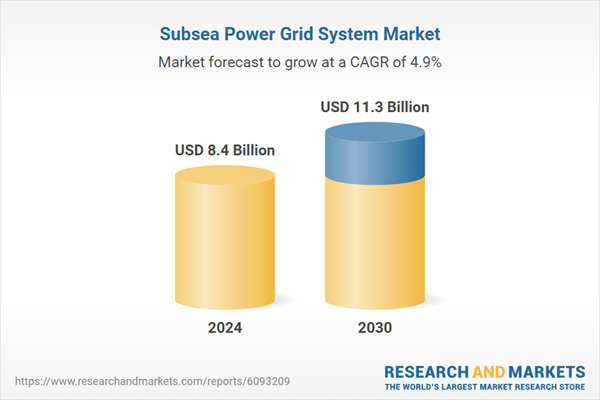Speak directly to the analyst to clarify any post sales queries you may have.
10% Free customizationThis report comes with 10% free customization, enabling you to add data that meets your specific business needs.
Technological advancements, including high-voltage direct current (HVDC) systems and improved insulation materials, are enhancing system reliability and efficiency, encouraging broader adoption. Additionally, increased investments in offshore infrastructure, coupled with regulatory support for green energy and the growing need for intercontinental power trading via subsea cables, are further strengthening market growth. The demand for robust grid systems capable of balancing intermittent renewable inputs continues to position subsea power grids as a critical enabler of sustainable energy development worldwide.
Key Market Drivers
Growing Demand for Offshore Renewable Energy Integration
The rapid growth of offshore renewable energy projects, especially wind and tidal power, is significantly propelling the global subsea power grid system market. As governments and corporations pursue decarbonization goals, offshore wind installations are expanding rapidly, offering consistent energy generation potential. However, their distance from shore-based demand centers creates the need for advanced subsea power transmission infrastructure.Subsea power grids serve this role by efficiently transporting electricity to onshore grids while minimizing transmission losses. These systems incorporate components such as high-voltage subsea cables, transformers, and switchgear, enabling stable and scalable energy integration. Notably, major industry investments, such as Iberdrola’s USD 2.7 billion acquisition of Electricity North West, reflect strategic efforts to expand energy networks and reinforce grid infrastructure. The continued growth of offshore energy capacity worldwide ensures sustained demand for robust and efficient subsea power grid solutions.
Key Market Challenges
High Capital Expenditure and Complex Installation Processes
The high upfront investment required for subsea power grid systems presents a significant market challenge. Developing and deploying these grids involves substantial capital due to the cost of specialized components like high-voltage cables, subsea transformers, and control systems. Installation complexities also contribute to elevated costs, as these projects require advanced vessels, seabed mapping, and precision cable laying across often challenging underwater terrains. Any errors in installation can lead to delays, system damage, or additional repairs. Furthermore, operational and maintenance challenges arise due to the remote and underwater nature of these systems, which demand specialized equipment such as remotely operated vehicles (ROVs) and divers. These logistical and financial barriers can deter investment, particularly in emerging markets or regions with limited offshore development infrastructure.Key Market Trends
Increasing Adoption of High Voltage Direct Current (HVDC) Technology in Subsea Power Transmission
A key trend transforming the subsea power grid system market is the widespread adoption of HVDC technology. Traditional alternating current (AC) transmission faces challenges in long-distance subsea applications due to high reactive losses and limited efficiency. HVDC overcomes these limitations, enabling efficient and stable transmission over hundreds of kilometers. HVDC systems use converter stations to transform AC to DC and back, minimizing losses and enhancing capacity. This makes HVDC particularly well-suited for connecting large-scale offshore wind farms and enabling cross-border energy exchanges through undersea interconnectors. As demand for clean energy grows, HVDC technology is becoming integral to the infrastructure enabling global energy transitions, offering enhanced performance for modern subsea grids.Key Market Players
- ABB Ltd.
- Siemens Energy AG
- General Electric Company (GE Renewable Energy)
- Nexans S.A.
- Prysmian Group
- JDR Cable Systems Ltd.
- Hengtong Group Co., Ltd.
- NKT A/S
Report Scope:
In this report, the Global Subsea Power Grid System Market has been segmented into the following categories, in addition to the industry trends which have also been detailed below:Subsea Power Grid System Market, By Power Generation Type:
- Captive Generation
- Wind Energy
- Others
Subsea Power Grid System Market, By Application:
- Offshore Wind Farms
- Oil and Gas Platforms
- Undersea Mining Operations
Subsea Power Grid System Market, By Region:
- North America
- United States
- Canada
- Mexico
- Europe
- Germany
- France
- United Kingdom
- Italy
- Spain
- Asia Pacific
- China
- India
- Japan
- South Korea
- Australia
- South America
- Brazil
- Colombia
- Argentina
- Middle East & Africa
- Saudi Arabia
- UAE
- South Africa
Competitive Landscape
Company Profiles: Detailed analysis of the major companies present in the Global Subsea Power Grid System Market.Available Customizations:
With the given market data, the publisher offers customizations according to a company's specific needs. The following customization options are available for the report.Company Information
- Detailed analysis and profiling of additional market players (up to five).
This product will be delivered within 1-3 business days.
Table of Contents
Companies Mentioned
- ABB Ltd.
- Siemens Energy AG
- General Electric Company (GE Renewable Energy)
- Nexans S.A.
- Prysmian Group
- JDR Cable Systems Ltd.
- Hengtong Group Co., Ltd.
- NKT A/S
Table Information
| Report Attribute | Details |
|---|---|
| No. of Pages | 188 |
| Published | June 2025 |
| Forecast Period | 2024 - 2030 |
| Estimated Market Value ( USD | $ 8.4 Billion |
| Forecasted Market Value ( USD | $ 11.3 Billion |
| Compound Annual Growth Rate | 4.9% |
| Regions Covered | Global |
| No. of Companies Mentioned | 8 |









